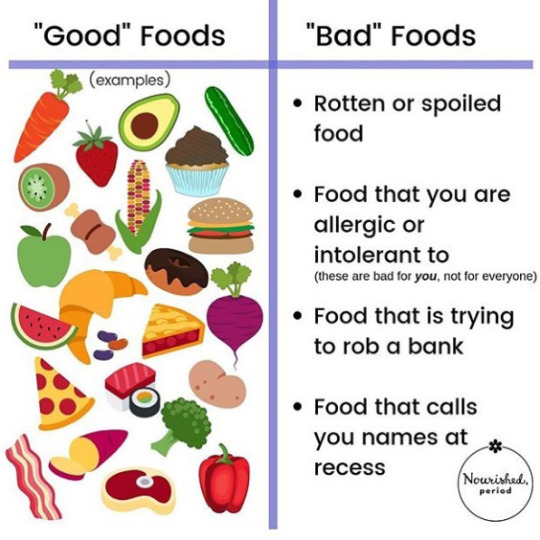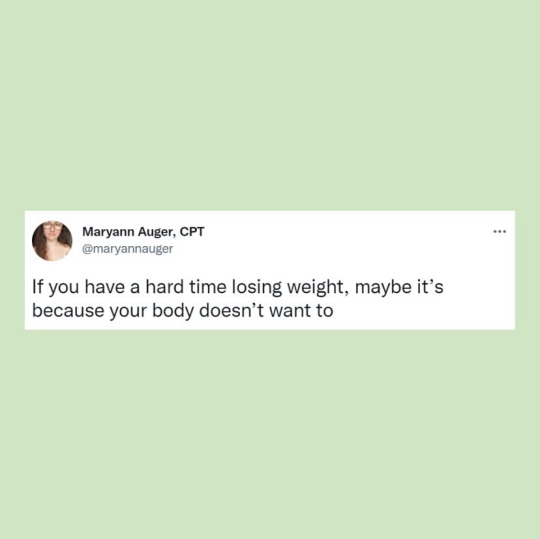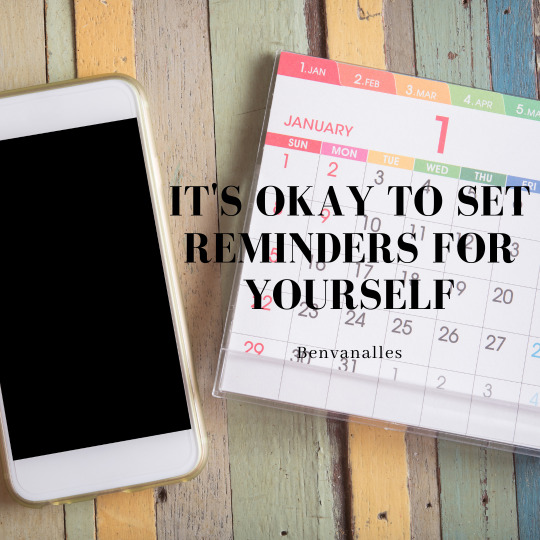Photo

Did your food try to kill someone? Did it hit a baby? Did it insult you? No? Congrats, what you are eating isn’t bad!
41K notes
·
View notes
Text
Health is not a moral
Being unhealthy is not immoral. Unhealthy people are people.
Abled thin people want to believe that so long as they are Good, they won’t become disabled or gain weight. They want to believe it is within their control, when the truth is that it’s not. It’s just circumstance.
I also want to clarify that the two things are not mutually inclusive, but society thinks fat = unhealthy, and even if that was true, it would not justify their treatment, and this as a concept feels like ableism. Not to mention that oftentimes, fat as an indication of health is frequently caused by mental/physical disabilities, and the solution is not to oppress them. They need proper, quality assistance, and it won’t inherently make them not fat anymore.
11 notes
·
View notes
Text

My grandmother is in her 70s and she's still talking about wanting to lose weight. She's been pursuing weight loss and fighting against her body for decades.
The pressure to lose weight is strong and it can be especially for those who live in bigger bodies and experience discrimination for the size of their body.
I try to make it clear that I'm never judging anyone for wanting to lose weight. There are many different reasons for pursuing weight loss, but I also want to offer this reminder:
Our bodies love homeostasis (balance), and it will work really hard to keep you where it’s happiest. For example, our bodies regulate our temperature constantly to keep us at a relatively stable temperature.
The same thing happens with our body weight. Our bodies like to stay at a relatively stable weight. That’s why sometimes we hit ‘plateaus’. While the diet industry might tell you to shock your body and to push harder to break that plateau, I encourage you to ask yourself this question: What if I have a hard time losing weight because my body doesn’t want me to?
25 notes
·
View notes
Text
hey! there aren’t enough posts out there for men who don’t fit traditional standards of beauty/masculinity. so this one’s for you.
short men
fat men
skinny men
men with small hands/feet
men with small dicks
men with thin arms and narrow chests
men who don’t have deep voices
men with stutters and other speech impediments
men with wide hips
men with visible disabilities
men who can’t grow facial hair
men with boobs (from fat not muscle)
men with tiny/huge/weirdly shaped nipples
men with flat asses
men with round faces
men who don’t have defined cheekbones or jawlines
men with patchy/wispy/uneven facial hair
men with receding hairlines, thin hair, and/or bald spots
men with stretch marks
men with large/uneven teeth
men with freckles
men with acne and other skin conditions
men who are super hairy
men with large/noticeable birthmarks
men who are super pale and cannot tan
sweaty men
men that don’t have defined muscle (even when they flex)
men with large ears/noses/lips/etc
men with terrible posture
men with tics and stims
men with visible scars/burns/etc
men with double chins and rolls and flab
men who can’t/don’t want to work out
trans men who look “feminine”
cis men who look “feminine”
men are told their features are “scary” or “creepy”
men who are told their features are “ugly” or “gross”
men who are told to change who they are in order to be “real men”
i mean this from the bottom of my heart:
you are handsome. you are masculine enough. you are worthy of as much love and respect as anyone else. you deserve to see yourself on the cover of magazines and billboard signs and playing the superhero in the latest film. you aren’t creepy for wanting to be loved. you aren’t wrong to have confidence. you don’t need to “fix” the physical features other people don’t like because guess what? you. are. beautiful.
299 notes
·
View notes
Text
The idea that fat people are only worthy as long as they’re healthy is bullshit.
Fat people are worthy regardless of their health status.
1K notes
·
View notes
Note
you're wonderful as you are. thank you for existing ♡
That is so incredibly sweet, thank you <3
I'm glad you're here with me.
0 notes
Text

As someone who is autistic and has ADHD I know how hard it can be to pick up on body cues for eating, going to the bathroom, and other bodily functions that come so naturally to our neurotypical peers.
It is often only when we're starving or bursting that we recognize the cues our body is giving us and it may set us up for a downward spiral throughout the day. As with everything else there is nuance in this, but if this is something that happens to you and you want to break that pattern, it is 100% totally ok to set reminders on your phone or calendar to eat, go to the bathroom, etc.
Intuitive eating is just not for everyone. Recognizing body cues isn't accesible for everyone.
And it is completely ok if you need audio and visible reminders for things like hunger and bathroom cues.
You are not broken and it is not wrong.
Needing an aid for these things is completely fine.
You wouldn't shame a blind person for needing a cane, or a deaf person for needing hearing aids.
This falls in that same category. Use the aids that work for you and your body if that is what you need to get through your day.
#actually autistic#actually neurodivergent#actually adhd#anti diet culture#actually disabled#health at every size
13 notes
·
View notes
Text
For the anon who asked for my take on/more info on body neutrality. Please be advised this is just my take on it:
Body neutrality is a fundamental part of intersectional feminism: because beauty standards are rooted in white supremacist culture/ableist culture/heteropatriarchal oppression and capitalist oppression, body neutrality reappropriates and recenters our bodies as OUR vessels/part of us, rather than a site of violence visited on us.
The concept of body neutrality came out of the lived experiences of people with marginalized bodies, who found much of the prevalent discourse about bodies (including body positivity) to be traumatizing.
Bodies are marginalized when they are NOT cis, white, young, able, pain-free, thin, and conforming. This means that almost all bodies are marginalized.
‘So what’s the problem with body positivity?’—the problem is that body positivity focuses on ‘every body is beautiful, every body deserves to be loved’. This is predicated on the idea of expanding existing standards of beauty, rather than striking at the core of how fucked up beauty standards are (see #1 above). It also burdens the body’s owner with the responsibility for loving their body—something that is often difficult to do for people with disabilities, chronic pain, or various forms of dysmorphia.
‘So what IS body neutrality?’ It’s this:
If you’re a human and you’re alive, you have the experience of having a body.
The body that you inhabit is where you live.
The body you inhabit IS NOT a measure of your worth.
The people in your life, and the parts of our society that suggest that your body = your worth are incorrect, and operating from some very terrible and misinformed beliefs (see #1)
It’s okay to love, or not love, the body you live in, or do both at different times. If you’re existing in it, your body is sufficient.
984 notes
·
View notes
Text
Your weight does not define you.
Your weight does not define you.
Your weight does not define you.
1K notes
·
View notes
Text
Don't wait until you lose weight so you can buy yourself some pretty clothes. You should wear beautiful clothes that fit you, instead of struggling with your own body to fit into them. Don't deprive yourself of something that will make you feel good because you aren't "thin enough" to "deserve it". You deserve good things as you are now.
2K notes
·
View notes
Text
friendly reminder that if you have a hard time eating due to nausea or other chronic illness ickies, just eat what you can eat. even if it’s not particularly “healthy,” getting calories in your body to help it function is more important.
82K notes
·
View notes
Text
i’m getting increasingly concerned about the ascendancy of the intuitive eating model in eating disorder treatment. intuitive eating is not an appropriate intervention for people with active eating disorders; it’s never the first line of treatment (it’s usually the last! and it isn’t essential).
i swear diet culture did this sleight of hand where it declared that the opposite of diet rules is ~intuition~, but it’s not rules that are a problem, it’s restriction, and when you tell a bunch of restriction-programmed people to listen to their intuition, they’re gonna restrict.
ESPECIALLY if their brains have a phobic response to food, which is the deal w clinical EDs. in that case you feed the starved brain or the deprived body, you do the intentional exposure to feared foods, you follow a plan and rules back to life.
people with eating disorders will follow our intuitions to becoming mortality statistics. we really will, and do. intuitive eating comes after refeeding and renourishment, and if it doesn’t come at all, fine.
early recovery is not intuitive–it feels bad and scary bc we’re doing exactly what our brains are screaming at us not to do. and it gives us our lives back.
987 notes
·
View notes
Text
if you have a somewhat irregular eating pattern that works for you, great! if your body wants a little at breakfast and a lot at other meals, or the reverse, or something else entirely, and you have your energy needs met and aren’t suffering, there’s probably no need to do anything different.
but if, like many people, you end up reactively eating (”bingeing”) when you get home from work or school, or at bedtime, or during the night, or on the weekends, and you’re suffering bc of it, then you’ve got to eat more during the day. in as kind a way as possible, you have to make yourself do it (if you want the bingeing to stop, which is up to you).
eat a substantial breakfast, lunch, and dinner, with snacks in between. most people do best eating every few hours. no restrictions on food types, either- eat exactly what you crave, or if no craving/hunger feels present, eat what you know you need (i mean calories first & foremost).
everyone, EVERYONE, who has what they experience as out-of-control eating starts out thinking that they just need to Not Binge. just not do the reactive eating after work or at night or on the weekend… like white-knuckle or mindfulness their way to moderation. that’s not it.
you eat your way to stability with food. it’s really, really about the food.
596 notes
·
View notes
Text
This one's for people with restrictive EDs who come in all sizes and found that everyone treated them better the thinner they were. For those of you whose bodies were romanticized when you were skeletal and ignored as you got better. For the fat people who gave up on weight loss because they had to stop restricting to get better and now everyone treats you like this means you're doing worse. I want you to know that you are healing as the world stays sick, and the world's sickness is not your fault. It's not your responsibility to stay sick to please anyone who doesn't value your true best interests.
It is hard to be healthy in a sick world, and I see how hard you are working, and I love you and see your value and I know that you deserve to heal.
625 notes
·
View notes
Text
There is no other health related topic in our culture that we treat with such heartless, oblivious cruelty as we do fatness.
If we acknowledged that being fat had a lot less to do with simple personal choice and laziness and had a lot more to do with genetics, social conditioning, income level and disordered eating brought on by a fat phobic diet culture, we wouldn’t dream of saying the things that people say around fat people.
“I’ve been so bad, eating that extra cookie,” my thin coworker says to me in the cafeteria.
“I have to be careful, or I’ll gain weight.”
“I can’t have too many of those, or I’ll get fat.”
“I’ve been so bad and wrong and I ate that thing I shouldn’t have eaten.”
These comments all mean one thing. “If I eat this, I’ll end up like YOU, and that would be unimaginably horrible.”
How fucked is that? I mean, the majority of kind, reasonable people know that calling someone fat as a derogatory criticism is rude, but somehow, they haven’t made the leap to understanding that complaining bitterly about the possibility of becoming fat in front of a fat person is like… next level fucked up.
Remarking on the terribleness of developing a body like the one owned by the person standing in front of you is ludicrously rude, and yet fat people are actually expected to play along. To join in with exclamations of “oh I KNOW. I’ve been so BAD over the holidays!” or “I feel you. I’ve got to stay away from those cookies too!”
These kinds of comments are really meant as a way for diet obsessed people to bond with others. “We all hate our bodies right? None of us want to be fat, right? We can all agree that being fat is a horrible thing to be.”
Women and fems are especially expected to play this self hatred bingo game. It extends to us complaining about our hair, our features, our asses, our chins, our height, our waist size, the quality of our skin, and so on and so on forever.
Diet culture makes you hate yourself, and it blinds you to the insensitive cruelty that those attitudes bring out in people. It is poison and it needs to be dismantled.
185 notes
·
View notes
Text
you don’t have to change your life overnight, but try to add good things to each day.
345 notes
·
View notes